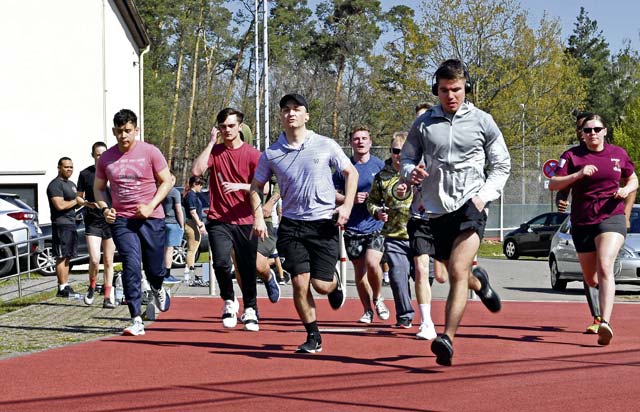
Airmen assigned to Ramstein have a wide variety of supporting agencies available to them, however not all Airmen have time to take advantage of those agencies – that’s where Project PHNX comes into play.
Currently in the early rollout phase, Project PHNX, short for ‘pairing health, nutrition and exercise,’ aims to give Airmen easier access to medical specialists, chaplains, military family life consultants as well as points of contact in finance and the fitness centers.
“Ramstein is a very, very busy installation and it’s hard for Airmen to find the time to make an appointment,” said Maj. Noah Palicia, 86th Airlift Wing Project PHNX team lead. “So instead, we’re bringing that care, education and coaching to the squadron. This saves time, effort and provides quick access to the care Airmen deserve.”
That change in philosophy from reactive care to proactive care was a key factor in the decision to create Project PHNX.
“We meet with Airmen where they’re at,” said Capt. Lynsee Moberg, 86th Medical Group health promotions manager dietitian. “As Project PHNX members we go into the squadron and introduce ourselves during shift changes or meetings. Now that they’re seeing a familiar face, we’ve seen an uptick in use and a decrease in stigma in services like mental health.”
The 86th Security Forces Squadron was the first unit to implement the program, and Project PHNX has since expanded to the 86th Maintenance Group.
“We went in and identified their top concerns and started targeting those issues,” Palicia said. “Along the way, we’ve taken notes and feedback. We adjusted our plan a little bit to continue making positive changes for the Airmen in the squadron.”
Data points such as sleep patterns, injuries sustained while on duty, nutrition habits and more were tracked throughout the initial rollout with 86 SFS Airmen and used to improve the Project PHNX plan.
“Something not captured in our initial data collection was the style of body armor worn by security forces Airmen,” Palicia said. “We discovered there’s a lighter version of body armor, reducing the amount of weight carried by these Airmen by 20 pounds.”
Project PHNX also tackles quality of life needs based on concerned raised by Airmen.
“Airmen provided feedback that they needed healthier options since the dining facility closed,” said Palicia. “Our team worked with AAFES to get a food truck located near where Airmen live and work.”
The Project PHNX team works to tailor their projects to the needs of the squadron participating in the program.
“This is a great program. I hope other squadrons can benefit from these resources that are available to them,” said Master Sgt. Bennie Prescott, 86 SFS training section chief. “We’ve seen drastic improvements with our physical health, our mental health, our eating habits and our physical training program. All of that has helped us develop more resilient Airmen.”


